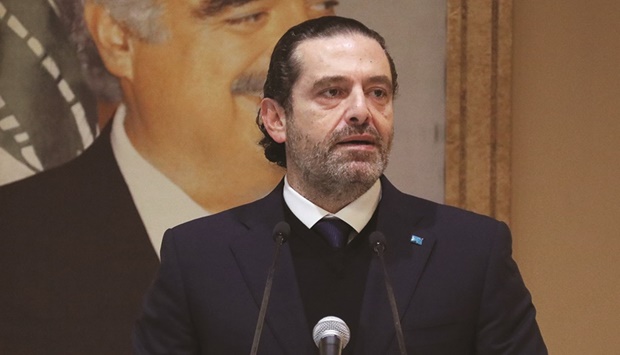Lebanese leader Saad al-Hariri said yesterday he was stepping back from political life and would not run in the parliamentary election, turning Lebanon’s sectarian politics on its head as the country grapples with a financial crisis.
Hariri, three times prime minister, also called on his party not to run any candidates in May’s vote, indicating several factors were behind his decision, including a reference to the Hezbollah.
Hariri’s Future Movement has long been the biggest representative of one section of a community, controlling one of the largest blocs in parliament that also included members of other sects — seats which others can now win.
The move injects huge uncertainty into Lebanese politics just months ahead of the election, in which Hezbollah’s adversaries had hoped to overturn a majority it won with its allies in 2018.
Some analysts have said a boycott by Lebanon’s largest movement, which would leave the political scene in disarray, may lead to calls for a delay.
In a televised address, Hariri said he had decided to “suspend any role in power, politics and parliament”, his voice breaking with emotion as he spoke in front of a portrait of his father, Rafik al-Hariri, who was assassinated in 2005.
“I am convinced that there is no room for any positive opportunity for Lebanon in light of influence, international disarray, national division, sectarianism, and the collapse of the state,” he said.
While Hariri has remained Lebanon’s leading politician since inheriting his father’s political mantle, his political fortunes have waned in recent years, with his position weakened by the loss of support from the Gulf region.
Future lost a third of its seats in 2018, some of them to Hezbollah-allied groups.
Walid Jumblatt, Lebanon’s leading Druze politician, told Reuters the announcement was “very sad because we are losing a major pillar of independence and of moderation”. “It means a free hand for Hezbollah,” he added.
Hariri’s announcement comes as Lebanon suffers an economic meltdown which the World Bank has described as one of the sharpest ever globally.
Mohanad Hage Ali, a fellow at the Carnegie Middle East Center, said a boycott by Hariri “pulls rug from under the whole process, and would increase speculation that (the election) might not happen”.

Lebanon’s leading politician and former prime minister Saad al-Hariri delivers a speech in Beirut, yesterday.
